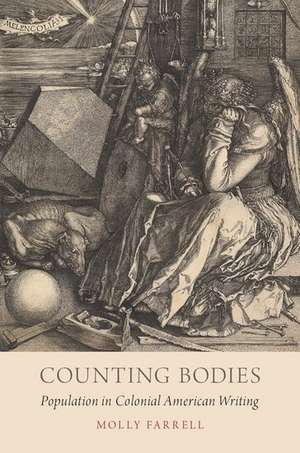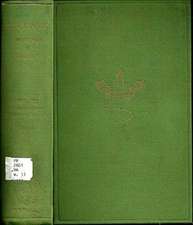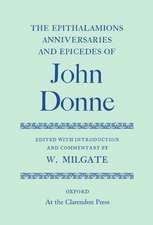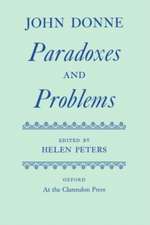Counting Bodies: Population in Colonial American Writing
Autor Molly Farrellen Limba Engleză Hardback – 22 sep 2016
| Toate formatele și edițiile | Preț | Express |
|---|---|---|
| Paperback (1) | 214.83 lei 31-37 zile | +155.28 lei 7-13 zile |
| Oxford University Press – 31 ian 2019 | 214.83 lei 31-37 zile | +155.28 lei 7-13 zile |
| Hardback (1) | 527.27 lei 31-37 zile | |
| Oxford University Press – 22 sep 2016 | 527.27 lei 31-37 zile |
Preț: 527.27 lei
Preț vechi: 705.37 lei
-25% Nou
Puncte Express: 791
Preț estimativ în valută:
100.91€ • 104.95$ • 84.45£
100.91€ • 104.95$ • 84.45£
Carte tipărită la comandă
Livrare economică 04-10 martie
Preluare comenzi: 021 569.72.76
Specificații
ISBN-13: 9780190277314
ISBN-10: 0190277319
Pagini: 296
Ilustrații: 26 illus.
Dimensiuni: 213 x 147 x 25 mm
Greutate: 0.47 kg
Editura: Oxford University Press
Colecția OUP USA
Locul publicării:New York, United States
ISBN-10: 0190277319
Pagini: 296
Ilustrații: 26 illus.
Dimensiuni: 213 x 147 x 25 mm
Greutate: 0.47 kg
Editura: Oxford University Press
Colecția OUP USA
Locul publicării:New York, United States
Recenzii
Farrell's Counting Bodies examines ways of counting people in the British Colonial Atlantic using forms of literature such as poetry, captivity narratives and travel writing and mortality bills. Farrell makes the claim that such texts, disparate as they may be, nonetheless offer insight into what she terms human accounting in the seventeenth and eighteenth century colonial context.
I was continually excited by this book, and was especially struck by the way that Farrell's focus on the literary representation of population, and particularly on bodies that are difficult to count, might open up new possibilities for thinking about the complexity and variability of colonial American ideas of community. I'm persuaded, for example, that her book can help us think about colonial understandings of disability, another form of human categorization that was just beginning to emerge during this period. ... Just as important, however, is her careful attention to how writers in early America obstructed, disallowed, and resisted this kind of counting. Farrell's book is worth thinking with, and I'm eager to see how her methods and conclusions might further expand and enliven our understanding of what it meant to count and be counted in colonial communities.
Counting Bodies takes a very stimulating approach to its subject matter, and as an alternative route to understanding the emergence of population ideas it is to be welcomed.
I was continually excited by this book, and was especially struck by the way that Farrell's focus on the literary representation of population, and particularly on bodies that are difficult to count, might open up new possibilities for thinking about the complexity and variability of colonial American ideas of community. I'm persuaded, for example, that her book can help us think about colonial understandings of disability, another form of human categorization that was just beginning to emerge during this period. ... Just as important, however, is her careful attention to how writers in early America obstructed, disallowed, and resisted this kind of counting. Farrell's book is worth thinking with, and I'm eager to see how her methods and conclusions might further expand and enliven our understanding of what it meant to count and be counted in colonial communities.
Counting Bodies takes a very stimulating approach to its subject matter, and as an alternative route to understanding the emergence of population ideas it is to be welcomed.
Notă biografică
Molly Farrell is Assistant Professor of English at The Ohio State University.











